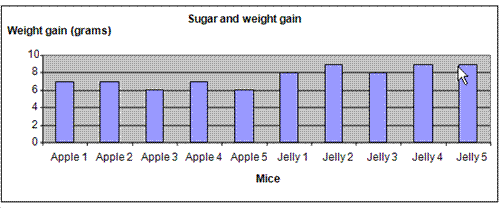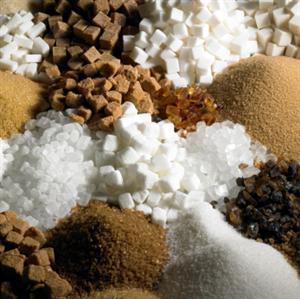| Complexity level: | 4 |
| Project cost ($): | 40 |
| Time required: | 1 hour to prepare, 14 days for the science project experiment |
| Material availability: | Mice may be purchased at a pet store. |
| Safety concerns: |
Hypothesis
Baby mice fed with jelly beans will gain weight more quickly than those fed with apples.
Overview
Sugar
Sugar is a sweet flavored crystallized substance that is made from sucrose obtained from sugarcane. It has a sweet taste and is the main ingredient in many beverages and food delicacies. Sugar is a simple carbohydrate. In milk, it exists in the form of lactose, in fruits, as fructose and as sucrose in refined table sugar.
When too much sugar is consumed, it gets absorbed into our blood stream and our blood sugar levels will rise. This causes the pancreas to secrete more insulin to convert the sugar and to store it for future use in our bodies. This causes the person to gain more weight.
Eating too much sugar-rich food like chocolate cakes and other sweets can be both addictive and bad for health. Sugar normally gets digested and converted into energy very quickly. It makes us feel energetic and we begin to crave for more. This can lead to an addiction, and if not kept in check, eventually, health problems such as being overweight and diabetes.
Scientific Terms
Materials
The materials required for this science fair project:
- 10 mice, each less than a month old
- 14 apples
- 1 large packet of jelly beans
- 2 mice cages
- 2 feeding trays
- Old newspaper
- 1 digital weighing scale
Procedure
1. For this science fair project, the independent variable is whether the mice are fed with apples or jelly beans. The dependent variable is the amount of weight gain by the mice in 2 weeks. This is determined by measuring the weight of the mice before and after 2 weeks. The constants (control variables) are the number of mice used, the age of the mice and the period of observation.
2. 10 mice (which are less than a month old) are selected for this science fair project.
3. The mice are separated into 2 groups of 5 mice in each group. They are placed in separate cages labeled “apple” and “jelly”. The initial weight of the mice is checked using the digital scale and recorded in the table given below.
4. The mice in the cage labeled “apple” are fed with an apples everyday for the next 14 days. The apple contains about 50% sugar.
5. The mice in the cage labeled “jelly” are fed with jelly beans everyday for the next 14 days. The jelly beans contain 70% sugar. Weigh the apples and jelly beans and ensure that the mice in the two cages are given the same amount of food (in terms of weight) every day.
6. After 14 days, the weight of the mice is checked once more using the digital weighing scale and the results recorded.
7. The weight gain of the mice is calculated by deducting the initial weight of each mouse from its final weight and the results recorded in the table.

Results
It was observed that the mice fed with the jelly beans demonstrated a slightly higher weight gain compared to the mice fed with apples.
|
Weight of mice fed with apples and jellies ( grams - rounded to the nearest gram) |
||||||||||
|
Apple 1 |
Apple 2 |
Apple 3 |
Apple 4 |
Apple 5 |
Jelly 1 |
Jelly 2 |
Jelly 3 |
Jelly 4 |
Jelly 5 |
|
|
Initial weight |
16 |
18 |
15 |
16 |
15 |
18 |
18 |
17 |
15 |
16 |
|
Final weight |
23 |
25 |
21 |
23 |
21 |
26 |
27 |
25 |
24 |
25 |
|
Weight gain |
7 |
7 |
6 |
7 |
6 |
8 |
9 |
8 |
9 |
9 |
The graph below represents the results of our science experiment

Conclusion
The hypothesis that baby mice fed with jelly beans will grow more quickly than those fed with apples, is proven to be true.
Fruit contain natural sugar together with carbohydrates, minerals, fibers and vitamins that can be part of a healthy diet. Whilst fruit does contain a fairly high amount of sugar, anything that is taken in moderation can be included into a healthy diet.
Also consider
What would happen if the science fair project was repeated to compare the weight gain of male and female mice given the 2 types of diet?
The science fair project can also be done to observe the weight variation of fully grown mice given food with different levels of sugar.
References
Diet containing too much sugar can quickly cause weight gain - http://www.womenfitness.net/deit_sugar.htm
Carbohydrates – do they cause weight gain? - http://www.womenfitness.net/carbs.htm
Sugar - http://en.wikipedia.org/wiki/Sugar

